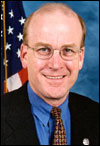
In the midst of one of the most pivotal presidential campaigns in decades, it’s easy to forget that we are on the brink of what could be a momentous election in the Senate as well: 34 senatorial seats are up for grabs this year, 19 of them currently held by Democrats, 15 by Republicans. Several of those seats could change parties on Nov. 2, and in a Senate where the GOP holds a narrow majority — 51 to 49 — over the Dems and one allied independent, merely a few such changeovers could tip the balance of power.
Many observers believe that Republicans are likely to maintain, or even increase, their majority in the Senate, as they’re expected to do in the House, where the Democrats’ chances are far slimmer. But predicting the outcome of close elections is a perilous game; many of these Senate races are as ambiguous as the Bush-Kerry battle.
“It’s plausible without a doubt that the Democrats could regain the majority in the Senate,” said Mark Longabaugh, senior vice president for political affairs at the League of Conservation Voters.
And yet there’s not much effort coming from the environmental community to make this plausible scenario a reality: The presidential election has absorbed the vast majority of the attention and resources in the current campaign season, and has pushed voter outreach for congressional campaigns to the back burner. The League of Conservation Voters, for instance, typically spends the majority of its campaign funds on congressional races, but this year only about one-sixth of its estimated budget of $6 million or more has been allocated to help elect eco-friendly candidates to the House and Senate; the lion’s share is being spent to help defeat George W. Bush.
But though all eyes are on the battle for the White House, congressional races are deserving of enviros’ attention. Many of Bush’s most controversial moves — environmental or otherwise — could never have been made without the cooperation of the GOP-dominated Congress. Six Senate races in particular — in Alaska, Colorado, Florida, Illinois, North Carolina, and Pennsylvania — have been featuring green issues prominently, and could in turn have powerful impacts on environmental lawmaking in the next Congress. If pro-environment candidates win in even half of these races, it could help usher through the Senate a number of key environmental bills, including the McCain-Lieberman Climate Stewardship Act.
Here Grist offers readers a chance to beef up on the good, the bad, and the ugly records of candidates in the Senate races that could matter most for the planet.
Colorado: Pete Coors (R) vs. Ken Salazar (D)
Colorado’s Senate race is expected to be one of the closest in the country, and “perhaps here more than anywhere else, environmental concerns will play a defining role in the outcome of the election,” said LCV’s Longabaugh. Thirty-seven percent of polled voters in the Centennial State consider themselves or someone in their household to be a strong environmentalist, according to a recent News 4/Rocky Mountain News poll.

Ken Salazar.
Ken Salazar, Colorado attorney general and former head of the state’s Department of Natural Resources, is facing off against beer magnate Pete Coors, chair of a company that has been fined millions of dollars for air- and water-pollution violations, and one of the righter-leaning Republicans running for the Senate.
Coors likes to play up his stint as former national president of the conservation group Ducks Unlimited, which advocates wetlands protections. He also hypes his appointment by Interior Secretary Gale Norton (a former Colorado attorney general herself) to the National Wildlife Refuge System Centennial Commission.
Salazar portrays himself as a grassroots environmentalist, having grown up on his family ranch in the San Luis Valley, which he said at a recent debate taught him to “develop a special relationship and a special sense of place through the ditches and the rivers and trees and the rocks and the soil.” And he can back up the fuzzy-wuzzy language: Salazar has endorsements from both LCV and the Sierra Club, and he’s got many successful battles against polluters under his belt. He created his state’s first environmental crimes unit as attorney general, and managed to slap one California businessman with a 17-year prison sentence for illegally dumping dry-cleaning effluent in Colorado.

Pete Coors.
Salazar is a strong opponent of drilling in the Arctic National Wildlife Refuge, while Coors supports it. Salazar backs an amendment on the ballot that would require Colorado’s biggest utilities to produce 10 percent of their electricity from renewable sources by 2015; Coors doesn’t want to mandate renewables development, but rather proposes tax credits to incentivize it. Salazar is cautious about pursuing more oil and gas development on the state’s Western Slope, not ruling it out, but arguing that more research needs to be done on the possible environmental impacts. Coors, meanwhile, has good reason to support more drilling; he serves on the board of directors of Energy Corporation of America, a Denver-based oil and gas exploration company.
The candidates also have opposing views on water use, one of this drought-stricken state’s hottest issues. While Coors sided with developers last year in favor of a statewide referendum that critics said could have diverted water resources away from rural Colorado and toward urban development, Salazar worked with a bipartisan coalition to bring the measure to a resounding defeat.
Salazar has a fighting chance in the Senate contest, but Coors is thought to have an edge given that 180,000 more voters are registered Republican than Democrat in Colorado.

Betty Castor.
Florida: Betty Castor (D) vs. Mel Martinez (R)
With Sen. Bob Graham (D) retiring, his seat will go either to Betty Castor, who has been endorsed by LCV and Wild PAC, or to Mel Martinez, a Cuban-born fiscal conservative who served in Bush’s cabinet as secretary of housing and urban development from 2001 to 2003 and helped lead the administration’s efforts on faith-based initiatives (until he resigned at the request of Karl Rove to run for Graham’s seat).
Castor served for years in the Florida Senate and for two terms as the state’s education commissioner. While a state senator, she fought utility lobbyists and helped limit solid waste and crack down on air and water pollution. She also founded Save Our Bay to protect Tampa Bay and in 1993 was named Conservationist of the Year by the Florida Audubon Society.
According to Castor’s spokesperson Matt Burgess, environmental issues are of particular concern in a state that counts tourism as its biggest industry: “Keeping our beaches and air clean is a huge part of our economy, and an important issue for the campaign,” he said.

Mel Martinez.
It’s no surprise, therefore, that offshore drilling is a sensitive issue in the Sunshine State, and both Castor and Martinez are opposed to it. Martinez, however, strongly supports other domestic drilling projects, including exploration in ANWR, and he backed Bush’s energy plan.
Castor, meanwhile, stresses the importance of energy efficiency and renewable energy on the path to energy independence. She has pledged to get serious about fighting global warming, and says she’ll work to cut emissions of carbon dioxide, sulfur dioxide, nitrogen oxide, and mercury pollution. She has also promised to help strengthen the Clean Water Act and rehabilitate the Superfund program.
Martinez, for his part, has clearly stated that he would green-light the Bush agenda across the board. “I cannot think offhand of a single issue in which I was not in line with the president on the major issues,” he told the Lakeland Ledger in August.
North Carolina: Erskine Bowles (D) vs. Rep. Richard Burr (R)
Erskine Bowles, who served as chief of staff during the Clinton administration, is facing off against Rep. Richard Burr for North Carolina’s open Senate seat. Bowles is a longtime advocate of environmental protections who’s been endorsed by LCV and the Sierra Club, while Burr’s 10-year record in the House of Representatives has earned him a 7 percent lifetime voting score from LCV. “Burr is without a doubt in the running for Biggest Environmental Bad Boy among candidates up for election in the United States Senate this year,” said Longabaugh.

Richard Burr.
In a radio ad running in the state, LCV bashes Burr for a vote he cast in favor of Bush’s energy bill, which included a provision exempting manufacturers of the gasoline additive MTBE from lawsuits seeking compensation for groundwater contamination. LCV argues that Burr was protecting campaign donors from the oil and gas industries, who have contributed $219,336 to his campaign since 1994, according to the Center for Responsive Politics. Enviros say that other blemishes on Burr’s green record include the six times he voted against the Outer Banks Protection Act, which would prevent drilling along the North Carolina coast. He has also supported the Bush administration’s rollbacks of Clean Air Act provisions and mercury rules and opposed endeavors to reduce greenhouse-gas emissions. His efforts have earned him a spot on LCV’s “Dirty Dozen” list of anti-environmental candidates.

Erskine Bowles.
Bowles, meanwhile, has publicly denounced the Bush administration’s rollbacks related to the Clean Air Act and Clean Water Act, and pledged to keep America’s cornerstone environmental laws intact if elected to the Senate. He has also promised to prohibit oil drilling off the North Carolina coast and clean up the air quality in the Smoky Mountains.
Bowles is not making much of an effort to tout his pro-environment record, however — presumably because he doesn’t want to scare off voters in this traditionally conservative state. “Erskine Bowles has been a businessman for more than 30 years,” said his spokesperson Carlos Monje. “The emphasis of his environmental message is that economic development and environmental protections go hand in hand. Protecting the environment is part of his jobs plan, his energy plan, and smart farming.” Monje added that while LCV has been airing ads condemning Burr’s environmental record, Bowles has no such plan: “We don’t think it serves the interests of our campaign to attack him in this area.”
Alaska: Tony Knowles (D) vs. Sen. Lisa Murkowski (R)
The Alaska race doesn’t present a clear-cut environmental hero — both candidates have peeved environmentalists with their strong support for drilling in ANWR. But state greenies argue that former Alaska Gov. Tony Knowles clearly presents a lesser threat. He is facing off against incumbent Lisa Murkowski, who was appointed by her father to fill the Senate seat he vacated in 2002 when he became Alaska’s governor.

Tony Knowles.
Among Knowles’ claims to infamy in the environmental community, he sued the Clinton administration to regain state control of federal lands (presumably so they could be used for development), took the U.S. EPA to court on behalf of the mining industry, and has harshly criticized John Kerry for his opposition to drilling in ANWR. (Some enviros fear that if elected, Knowles might convince other moderate Democrats in the Senate to support ANWR exploration.)
But this is par for the political course in Alaska, where residents receive annual dividend checks of roughly $1,000 from earnings on the state’s oil revenues and are notoriously hostile to land protections.

Lisa Murkowski.
Tom Atkinson, executive director of Alaska Conservation Voters, said that “environmental pragmatists” in Alaska overwhelmingly support Knowles over Murkowski, while the strict conservationists support neither. He explained that while many organizations are declining to endorse Knowles, there are plenty of individual environmentalists who are personally getting involved in fundraising for the Democratic candidate. “He’s good on national forest issues, pretty good on Tongass [National Forest] issues, good on oceans, good on transportation issues, good on issues related to the National Petroleum Reserve in Alaska. He would protect bird-molting areas from drilling, and he’s open to listening to us,” said Atkinson. “But it’s hard to get past his vigorous and aggressive stance on drilling in the Arctic Refuge.” Murkowski, on the other hand, “would give us nothing, nothing,” said Atkinson. Boasting an 11 percent LCV voting record, Murkowski has been an equally vigorous advocate of drilling in ANWR, as well as a big backer of the Alaska pipeline project, the Bush-Cheney energy plan, and subsidies for coal development in her state. She has also repeatedly attacked Knowles for his support of a Pew Oceans Commission effort to protect the nation’s sorely depleted fisheries; Murkowski and Alaskan business groups insist that the commission’s recommended protections would hamper industry growth.

Joseph Hoeffel.
Pennsylvania: Rep. Joseph Hoeffel (D) vs. Sen. Arlen Specter (R)
Democratic Rep. Joseph Hoeffel is trailing Sen. Arlen Specter by nearly 15 points, according to a recent Philadelphia Inquirer poll, but Hoeffel’s environmental record deserves a vote of confidence. His 2003 LCV rating of 95 percent dwarfs Specter’s 32 percent.
Hoeffel has consistently opposed Bush administration efforts to roll back Clean Air Act protections, while Specter has supported them. Hoeffel has voted for mandatory carbon-dioxide limits on industries, as well as tighter fuel-efficiency standards for cars and taxes on polluting companies that would pay for Superfund cleanups, while Specter has voted against these efforts. Hoeffel opposes drilling in ANWR and the Bush-Cheney energy bill, while Specter is an advocate of both.

Arlen Specter.
“Hoeffel is one of the strongest environmental allies we could hope for in the Senate,” Dave McGuire, vice chair of the Pennsylvania Sierra Club political committee, told Grist. “He’s fought the Bush administration every step of the way when they pandered to industry. He’s the kind of environmental hero we need right now.”
But, if the polls are any indication, he’s not the kind of environmental hero Pennsylvanians are likely to get.

Alan Keyes.
Illinois: Alan Keyes (R) vs. Barack Obama (D)
Drilling in ANWR also has the support of one Alan Keyes, the former U.N. ambassador who’s facing off against Democratic golden boy Barack Obama, who wants to see ANWR protected.

Barack Obama.
Obama’s got an impressive environmental record (check out this Grist profile). In brief, he advocates increasing the average fuel efficiency of cars to 40 miles per gallon, imposing stricter regulations on emissions of mercury and other air pollutants, and requiring that America derive 20 percent of its electricity from renewable sources by 2020. Keyes, meanwhile, advocates more nuclear-plant development and pooh-poohs tighter air regulations, arguing that current pollution standards are “too rigid,” according to a recent article in suburban Chicago’s Daily Herald.
This one’s no nail-biter. Obama is leading the race by such a vast margin — a whopping 45 points — that he is taking his show on the road, stumping for Democrats in other states.
